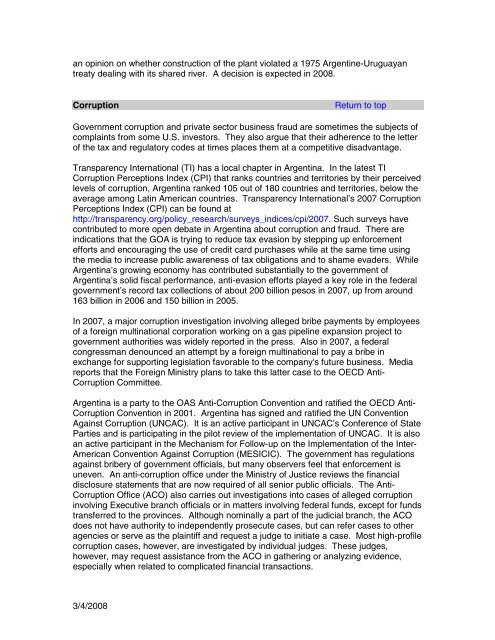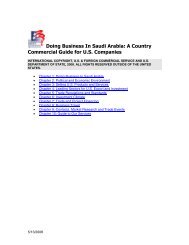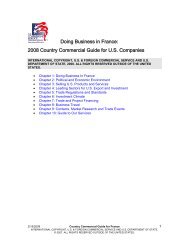Create successful ePaper yourself
Turn your PDF publications into a flip-book with our unique Google optimized e-Paper software.
an opinion on whether construction of the plant violated a 1975 Argentine-Uruguayan<br />
treaty dealing with its shared river. A decision is expected in 2008.<br />
Corruption Return to top<br />
Government corruption and private sector business fraud are sometimes the subjects of<br />
complaints from some U.S. investors. They also argue that their adherence to the letter<br />
of the tax and regulatory codes at times places them at a competitive disadvantage.<br />
Transparency <strong>In</strong>ternational (TI) has a local chapter in <strong>Argentina</strong>. <strong>In</strong> the latest TI<br />
Corruption Perceptions <strong>In</strong>dex (CPI) that ranks countries and territories by their perceived<br />
levels of corruption, <strong>Argentina</strong> ranked 105 out of 180 countries and territories, below the<br />
average among Latin American countries. Transparency <strong>In</strong>ternational’s 2007 Corruption<br />
Perceptions <strong>In</strong>dex (CPI) can be found at<br />
http://transparency.org/policy_research/surveys_indices/cpi/2007. Such surveys have<br />
contributed to more open debate in <strong>Argentina</strong> about corruption and fraud. There are<br />
indications that the GOA is trying to reduce tax evasion by stepping up enforcement<br />
efforts and encouraging the use of credit card purchases while at the same time using<br />
the media to increase public awareness of tax obligations and to shame evaders. While<br />
<strong>Argentina</strong>’s growing economy has contributed substantially to the government of<br />
<strong>Argentina</strong>’s solid fiscal performance, anti-evasion efforts played a key role in the federal<br />
government’s record tax collections of about 200 billion pesos in 2007, up from around<br />
163 billion in 2006 and 150 billion in 2005.<br />
<strong>In</strong> 2007, a major corruption investigation involving alleged bribe payments by employees<br />
of a foreign multinational corporation working on a gas pipeline expansion project to<br />
government authorities was widely reported in the press. Also in 2007, a federal<br />
congressman denounced an attempt by a foreign multinational to pay a bribe in<br />
exchange for supporting legislation favorable to the company's future business. Media<br />
reports that the Foreign Ministry plans to take this latter case to the OECD Anti-<br />
Corruption Committee.<br />
<strong>Argentina</strong> is a party to the OAS Anti-Corruption Convention and ratified the OECD Anti-<br />
Corruption Convention in 2001. <strong>Argentina</strong> has signed and ratified the UN Convention<br />
Against Corruption (UNCAC). It is an active participant in UNCAC’s Conference of State<br />
Parties and is participating in the pilot review of the implementation of UNCAC. It is also<br />
an active participant in the Mechanism for Follow-up on the Implementation of the <strong>In</strong>ter-<br />
American Convention Against Corruption (MESICIC). The government has regulations<br />
against bribery of government officials, but many observers feel that enforcement is<br />
uneven. An anti-corruption office under the Ministry of Justice reviews the financial<br />
disclosure statements that are now required of all senior public officials. The Anti-<br />
Corruption Office (ACO) also carries out investigations into cases of alleged corruption<br />
involving Executive branch officials or in matters involving federal funds, except for funds<br />
transferred to the provinces. Although nominally a part of the judicial branch, the ACO<br />
does not have authority to independently prosecute cases, but can refer cases to other<br />
agencies or serve as the plaintiff and request a judge to initiate a case. Most high-profile<br />
corruption cases, however, are investigated by individual judges. These judges,<br />
however, may request assistance from the ACO in gathering or analyzing evidence,<br />
especially when related to complicated financial transactions.<br />
3/4/2008












